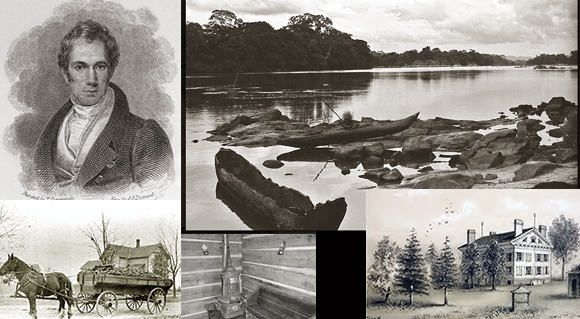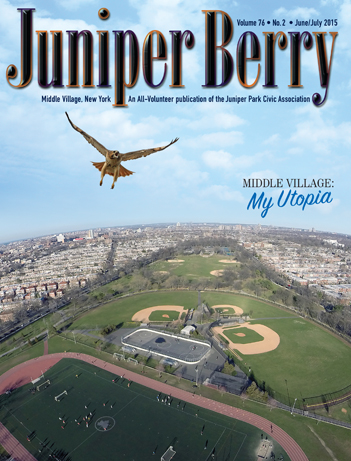What was life like in Maspeth in the mid-19th century? As you would imagine, most of Maspeth was farmland. But it also became an enclave of summer mansions for some of Manhattan’s wealthy.
One of the Manhattanites that settled in Maspeth every summer was successful businessman, Garrit Furman. A Queens native (he was born in 1782 in the town of Dry Harbor – now part of Glendale), Furman and his family resided during colder months at 94 Madison Street, located today between the Manhattan and Brooklyn Bridges east of today’s Chinatown. But the rest of the year, they lived on an estate known as “Furman Island” (previously Mott Island) in Maspeth’s western extreme, in the middle of Newtown Creek. There, they could fish, relax and enjoy nature.
Furman was good friends with James Maurice, an attorney and congress member who lived in a mansion along Maurice Avenue. He was also intimate friends with Governor DeWitt Clinton and Judge David S. Jones, the governor’s son-in-law, who inhabited the Sackett-Clinton Mansion on 58th Street. A well-to-do local farmer, John Van Cott, lived a little further east on Maspeth Avenue. Together, Furman, Maurice, Van Cott and Jones founded St. Saviour’s Church in 1847, which was within walking distance of all their homes. The organizational meeting at which St. Saviour’s was founded took place in a room at the Maspeth Hotel.
The location of this property is somewhat of a mystery. It is only referred to in the St. Saviour’s ledger, Furman’s writings and in a solitary legal notice found in a contemporary newspaper. It likely was in close proximity to the gentlemen’s homes in western Maspeth. It has been documented that the home of colonist James Way had served as a resort spot for Redcoat soldiers during the Revolutionary War and had been operated as a tavern after the war’s end. It also was a stagecoach stop during its history. In 1815, when Garrit Furman purchased the Furman Island (then Mott Island) property from the Mott family, the sale included the Way property, which they had possession of at the time. During Furman’s ownership, it is possible that the Way building had been operated as the “Maspeth Hotel.” (I could find no other records of hotels in the vicinity during this time period.) Furman frequented the hotel and enjoyed mingling with the locals and those passing through. He wrote an article for the Long Island Star newspaper under the pen name “Rusticus gent” that detailed his observations and conversations at the Maspeth Hotel with elderly Revolutionary War survivors.
A collection of Furman’s writings, known as The Maspeth Poems (1837) was recently republished by Sabin America and is available for purchase via Amazon.com. The book received many compliments from contemporary critics when it was originally published. From this book of poetry, we discover that Furman loved socializing at the Maspeth Hotel so much, that he celebrated it in song:
Maspeth Hotel – A Song.
AIR – “Auld Lang Syne”
Returning here from pleasure’s toil,
To rest our weary limbs;
How grateful is the social glass,
Which gaily swims.
CHORUS :
Our hearts to cheer again,
Our hearts to cheer,
Gay Bacchus gives the wine which flows,
Our hearts to cheer.
As we retire from toil and cares,
To rest our weary minds;
How pleasant is the social glass,
Pledged with our friends.
CHORUS
And as life’s tide is ebbing fast,
And cares would make us gray;
How friendly is the social glass,
To drive them away.
CHORUS
Then as we sit to chat awhile,
How welcome is one more;
When we are joined in social glee,
All happy sure.
CHORUS
The Maspeth Poems also contains a subset of poems known as “Rural Hours” which are dedicated to the four seasons of the year as experienced in the country. As we are headed into summer, we’ve reproduced part of this work below:
The Rural Hours: Summer
by Garrit Furman, 1837
When nature is all clothed in bright array –
With choicest flowrets strewed along the way;
And vegetation seems to seek repose,
And less of energy around bestows;
Her empire all in ample growth complete,
Maturing seems beneath the season’s heat;
Thus summer comes her mandate to proclaim,
With scorching visage reddened to a flame!
Awake! Awake my soul – nor stay to pause,
Contemplate here with me the great First Cause!
While yet slow hovering darkness rolls away,
And lingers in the breeze at break of day;
The lark, the cheerful messenger of morn,
Forsakes her nest to greet the day’s return.
And heaven’s great harbinger of light and day,
Majestic takes his high ethereal way.
(At his approach the paler stars retire,)
Reviving nature with his kindred fire,
Bids night no more his sable robes convene,
And all refulgence lights the busy scene.
The drowsy herdsman now reviews his charge,
Unbars his stalls and sets his flocks at large;
The ploughboy next comes trudging o’er the plain,
With merry heart to yoke his team again;
He slowly goads along the lounging pair,
As whistling on he goes for want of care.
Unconscious of his happier lot below,
In thought confined he wields his steady plough.
Furman, under the pen name “Rusticus gent,” also published a series of essays in 1847 known as “Long Island miscellanies”. This work gives a glimpse into life in Maspeth, Brooklyn and Manhattan in the late 18th and early 19th centuries. In “First visit to Maspeth” Furman explains how he fell in love with Mott Island as a child and for decades dreamed of purchasing the property. He snatched it up 3 days after it was first offered for sale by the Mott family. He also claims to have been the one to restore the name “Maspeth” to the town. At that point, the area was generally referred to as “English Kills” and Furman considered himself a loyal Patriot.
Garrit Furman passed away at his Furman Island home in June 1848, just weeks after the dedication of St. Saviour’s Church.
His son, William H. Furman, continued to live in the mansion and became an early promoter of fish farming. An 1889 article in the Brooklyn Eagle explains his setup: “Almost directly opposite on the east side of Maspeth avenue and running through to Grand street are the trout ponds and stone dwelling, or clubhouse owned by William H. Furman. The ponds, nearly half mile in length, are in the shape of the letter S, and are fed by boiling springs from the bottom. Owing to the heavy losses from poachers by reason of their nearness to the city, the ponds, as a trout preserve as well as for trout breeding were abandoned several years ago. They still afford fair fishing. In 1868 Mr. Furman marketed over one ton of trout from his Maspeth ponds.” Furman had moved further east on Long Island in 1885 as manufacturing interests began to close in on western Maspeth. The ponds closed down completely upon his death in 1893.
In 1899, the Furman mansion along with the rest of the estate was sold to industrial capitalists. The grand house was demolished according to a clause in the deed inserted by Garrit Furman’s widow. She did not want the house to inevitably fall into disrepair as other old homes in the area had. In subsequent decades, the waters around the property were filled in, eliminating the island, and it became covered by factories.
Today, the mansion is long gone, his namesake island has been wiped off the map, the future of the church he helped build sits in limbo and the Maspeth Hotel is also gone. But we can still get a sense of who Garrit Furman was and the places he frequented because past generations thankfully had the foresight to protect historical documents and photos throughout the centuries.
We’ll publish more of Garrit Furman’s prose and poetry in future issues of the Juniper Berry.



